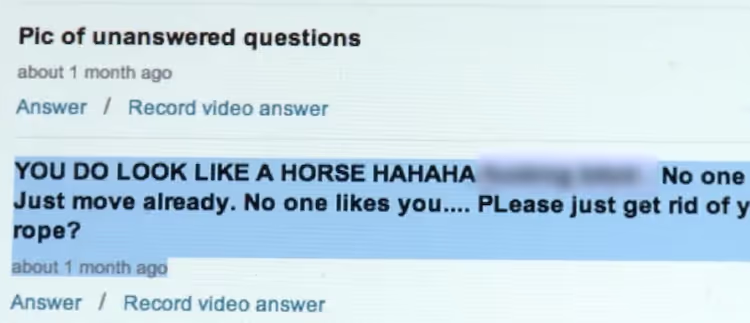


Cyberbullying is a big concern for parents, but how do we define it and do our children see it differently? The definition of bullying from StopBullying.gov is:
"Bullying is unwanted, aggressive behavior among school-aged children that involves a real or perceived power imbalance. The behavior is repeated or has the potential to be repeated, over time. Both kids who are bullied and who bully others may have serious, lasting problems.
In order to be considered bullying, the behavior must be aggressive and include:
Many kids have said to me that they don't see a lot of cyberbullying but once I probe deeper, I often hear about the ease with which kids say something mean just one time, about one incident. This would, by definition, not be classified as bullying. However, technology allows these one-off incidents to quickly spread and can turn them into repetitive incidents. Technology makes it easy to text or post something teens may not say in person. Another part that plays into this is that teens are also in the throws of developing impulse control and emotion regulation.
Learn more about showing our movies in your school or community!
Join Screenagers filmmaker Delaney Ruston MD for our latest Podcast

Learn more about our Screen-Free Sleep campaign at the website!
Our movie made for parents and educators of younger kids
Learn more about showing our movies in your school or community!
Learn more about showing our movies in your school or community!
Join Screenagers filmmaker Delaney Ruston MD for our latest Podcast

Learn more about our Screen-Free Sleep campaign at the website!
Our movie made for parents and educators of younger kids
Join Screenagers filmmaker Delaney Ruston MD for our latest Podcast
As we’re about to celebrate 10 years of Screenagers, we want to hear what’s been most helpful and what you’d like to see next.
Please click here to share your thoughts with us in our community survey. It only takes 5–10 minutes, and everyone who completes it will be entered to win one of five $50 Amazon vouchers.
Cyberbullying is a big concern for parents, but how do we define it and do our children see it differently? The definition of bullying from StopBullying.gov is:
"Bullying is unwanted, aggressive behavior among school-aged children that involves a real or perceived power imbalance. The behavior is repeated or has the potential to be repeated, over time. Both kids who are bullied and who bully others may have serious, lasting problems.
In order to be considered bullying, the behavior must be aggressive and include:
Many kids have said to me that they don't see a lot of cyberbullying but once I probe deeper, I often hear about the ease with which kids say something mean just one time, about one incident. This would, by definition, not be classified as bullying. However, technology allows these one-off incidents to quickly spread and can turn them into repetitive incidents. Technology makes it easy to text or post something teens may not say in person. Another part that plays into this is that teens are also in the throws of developing impulse control and emotion regulation.
Sign up here to receive the weekly Tech Talk Tuesdays newsletter from Screenagers filmmaker Delaney Ruston MD.
We respect your privacy.
Cyberbullying is a big concern for parents, but how do we define it and do our children see it differently? The definition of bullying from StopBullying.gov is:
"Bullying is unwanted, aggressive behavior among school-aged children that involves a real or perceived power imbalance. The behavior is repeated or has the potential to be repeated, over time. Both kids who are bullied and who bully others may have serious, lasting problems.
In order to be considered bullying, the behavior must be aggressive and include:
Many kids have said to me that they don't see a lot of cyberbullying but once I probe deeper, I often hear about the ease with which kids say something mean just one time, about one incident. This would, by definition, not be classified as bullying. However, technology allows these one-off incidents to quickly spread and can turn them into repetitive incidents. Technology makes it easy to text or post something teens may not say in person. Another part that plays into this is that teens are also in the throws of developing impulse control and emotion regulation.

More than half of teens ages 12–17 don’t know what sextortion is, despite nearly 1 in 5 reporting they experienced it as minors. New data from Thorn shows sextortion often involves demands for more images, in-person meetings, or ongoing relationships, and increasingly includes deepfake images. Awareness, clear definitions, and knowing where to get help are critical for prevention and response.
READ MORE >
So what is pornography, and how do we talk with our young people about this prickly topic? Every time I sit down to write about this, I feel a bit of sadness and, frankly, disbelief. It’s hard to accept that we’ve created a society where youth can be just a click away from all sorts of highly explicit sexual material. And yes, parental controls and blockers can help, but the internet is everywhere, and chances are, they will see things somewhere. But we have to talk about it.
READ MORE >
In today's blog I introduce and give a brief summary of my recent podcast conversation with Jo-Ann Finkelstein, PhD, psychologist and author of Sexism and Sensibility, where we spoke about many topics such as how to raise girls with fierce ambition and critical awareness of gender inequality without making them feel disheartened? And how we can help boys understand the hidden costs of rigid masculinity without shaming them into silence?
READ MORE >for more like this, DR. DELANEY RUSTON'S NEW BOOK, PARENTING IN THE SCREEN AGE, IS THE DEFINITIVE GUIDE FOR TODAY’S PARENTS. WITH INSIGHTS ON SCREEN TIME FROM RESEARCHERS, INPUT FROM KIDS & TEENS, THIS BOOK IS PACKED WITH SOLUTIONS FOR HOW TO START AND SUSTAIN PRODUCTIVE FAMILY TALKS ABOUT TECHNOLOGY AND IT’S IMPACT ON OUR MENTAL WELLBEING.
